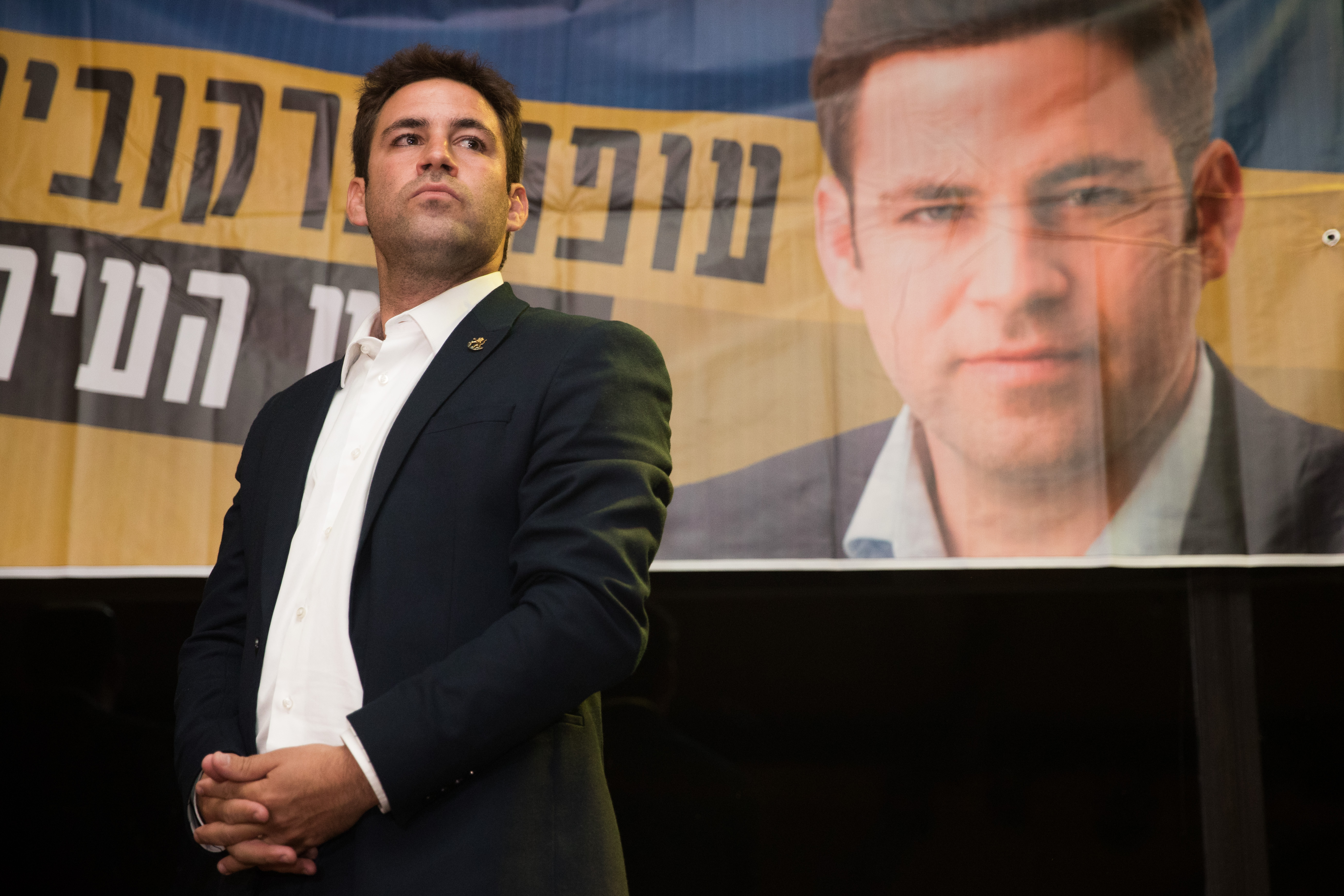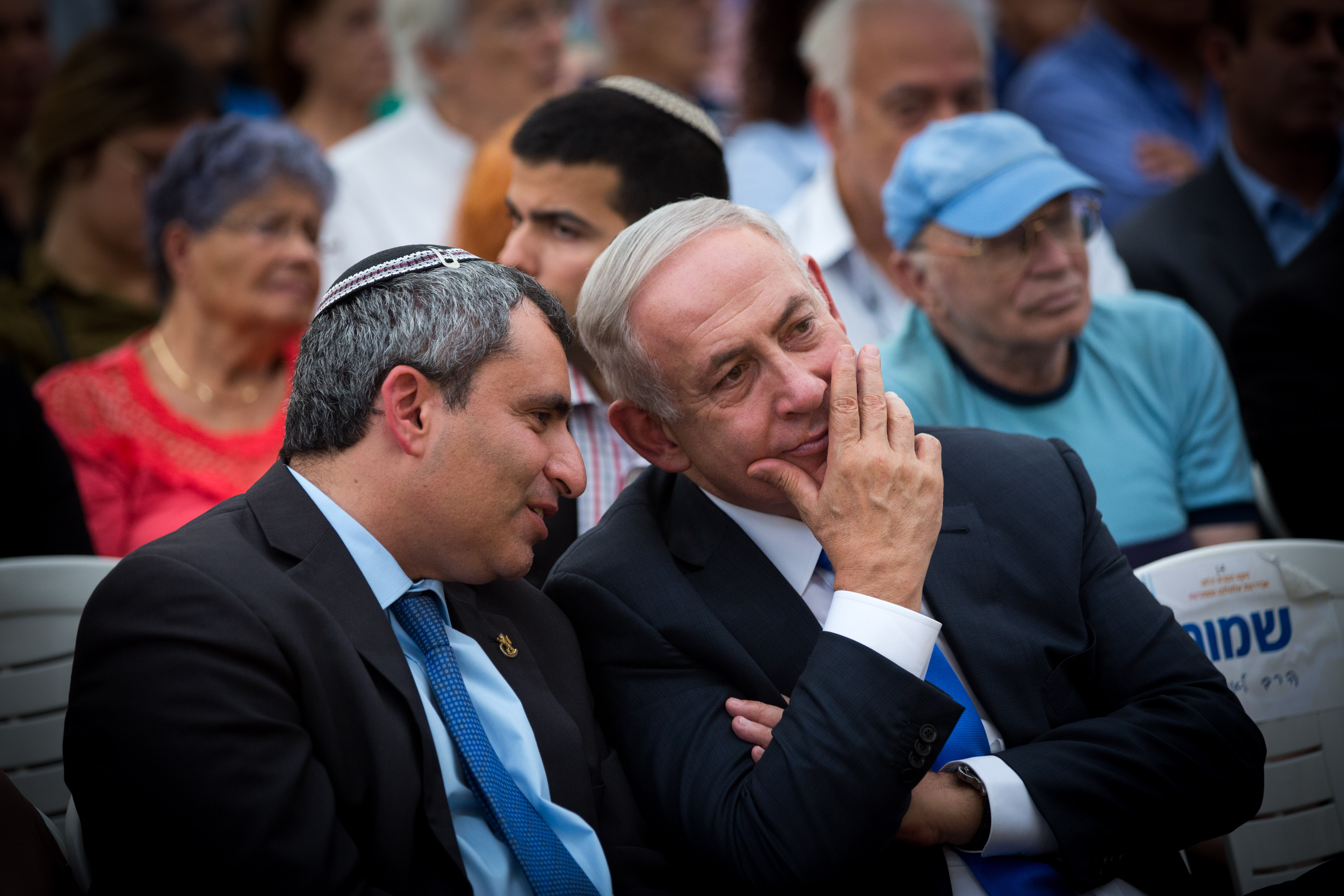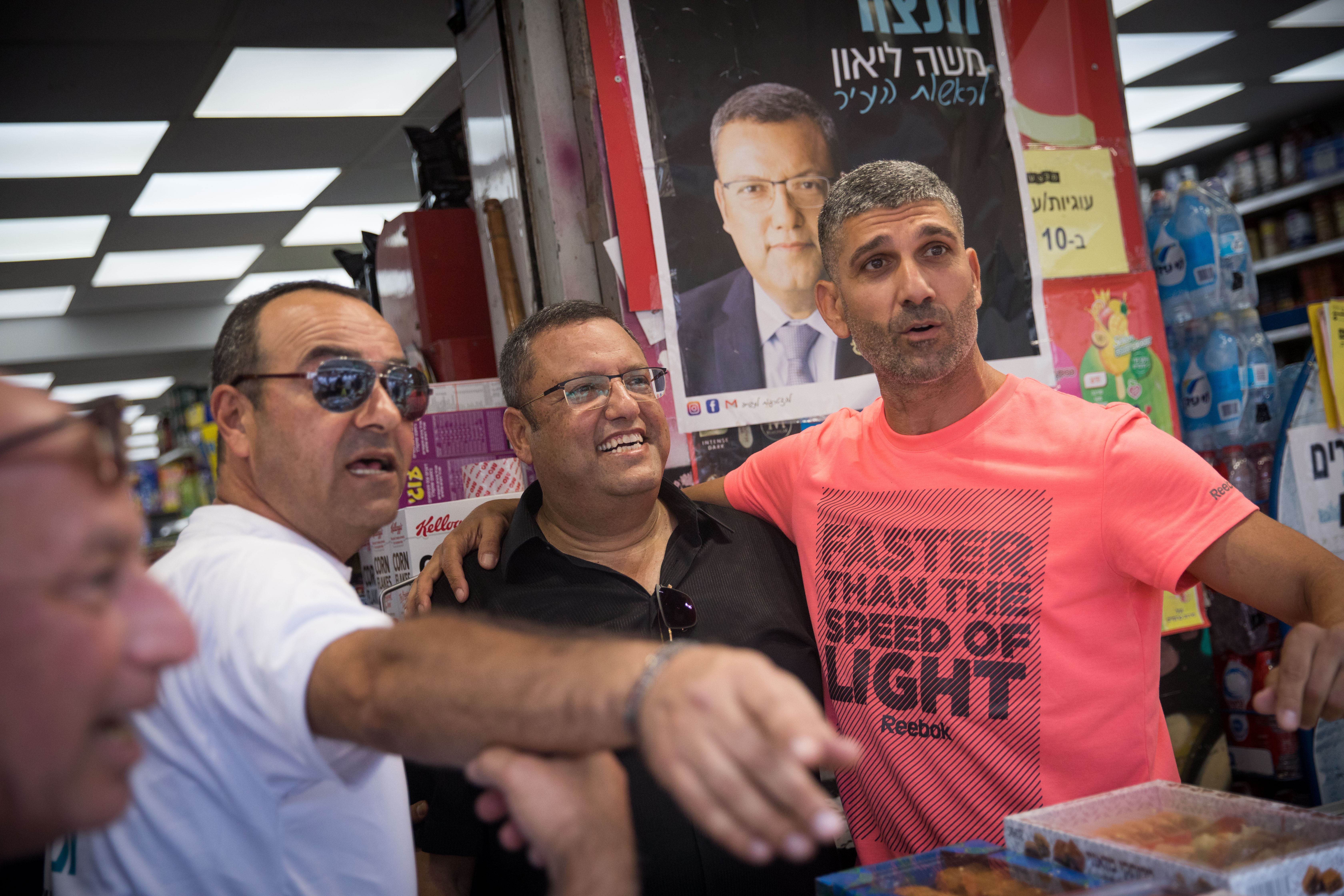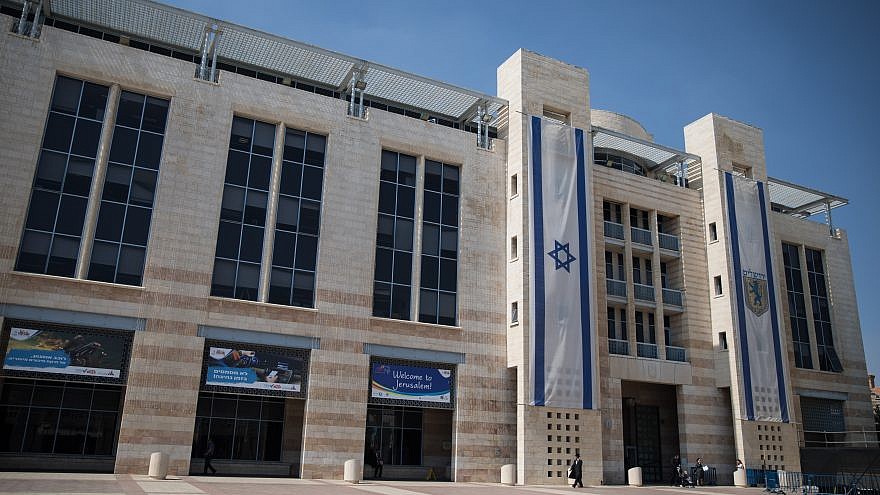The Midrash says there are 70 names of Jerusalem. To be sure, the quirks of Jerusalem history have added a few more along the way. Yet the city whose roots go back more than 5,000 years has only one mayor for all that nomenclature.
A new mayor will be selected next month to replace Nir Barkat, who has led Jerusalem since November 2008.
Berkovitch is a Jerusalemite through and through. He was born and raised in the Holy City, and in an interview with JNS said “Jerusalem has had a significant impact on my personality.”
The candidate began volunteering to help Jerusalem at a young age, including as a member of the Israeli Boy Scouts movement, through which he played various leadership roles, including serving as a senior youth instructor. Berkovitch served six years in the Israel Defense Forces—all in combat—and was discharged as a captain.
“Even as a young person, I felt I must give back and fight for the Zionist future of Jerusalem,” he said.

Berkovitch founded Hitorerut when he was only 25 years old. He joined the Schusterman ROI Community as a young City Council member to strengthen his networking skills and meet with other social, political and economic activists from around the world.
Five years ago, on a shoestring budget, he made it into the City Council, winning four seats. He worked closely with Barkat to increase the number of high-tech businesses in Jerusalem, taking credit for Jerusalem’s more than 500 high-tech companies, up from 200 five years ago. He infused funds into cultural activities and institutions, including expanding offerings at Bezalel Academy of Arts and Design, Beit Moriah and Beit Hansen.
Next month, just before the Oct. 30 elections, Berkovitch’s vision for a large and dynamic co-working space will come to fruition with the opening of WeWork Jerusalem on King George Street.
At age 36, he told JNS that he is ready to run one of the world’s most historical cities.
“I am young, but very experienced,” he said “Being younger means being full of passion and ready to work hard. I come with a small ego, so I will be able to cooperate with others, to work with the government ministers rather than fight with them, and to spread a new language of the common good.”
Berkovitch said he would be a mayor who wakes at 6:30 a.m. on a Sunday to clean the streets with the sanitation workers, demonstrating for them how important their work is to him and to the rest of the city.
He has proposed fining people for throwing cigarette butts on the ground, littering or failing to clean up behind their dogs. He also said that he will budget for new garbage trucks and bins, prompting Jerusalemites to take better care of a cleaner city.
Berkovitch worked closely with Barkat, but then broke ties with him in 2017, accusing the mayor of sacrificing the city’s interests in his pursuit of a career on the national stage, specifically by pandering to Jerusalem’s haredim, which comprises 39 percent of the city’s Jewish population. Berkovitch said he is not against the haredim, but said unlike his closest opponent Elkin and candidate Moshe Lion, his focus is on keeping Jerusalem “Zionistic, productive and pluralistic.”
“I don’t want to change the haredim,” he said. “I want to work with them.”
His constituency believes that he can accomplish his goals. So much so that former mayoral candidate Yossi Havilio announced just after Rosh Hashanah that he would step out of the race to support Berkovitch for mayor. He said in a release that he intends “to concentrate on elections to the city council, so that the ‘Save Jerusalem’ movement will be a strong and significant faction.”
Havilio, who was also interviewed by JNS before dropping out of the race, said he, like Berkovitch, was running for a pluralistic city—“a unified Jerusalem with a chance for unity between secular, traditional and Orthodox Jews, with color and diversity.”
He told JNS, “I want people to be able to live how they want.”
For his part, Berkovitch was involved in opening a haredi high-tech branch in Jerusalem that has employed thousands of ultra-Orthodox men. He also supported a similar facility in eastern Jerusalem.
“We are only going to succeed in Jerusalem if all sectors succeed,” said Berkovitch. “We need to be responsible for each other.”
JNS asked each candidate what fruit they would compare to the City of Gold. Berkovitch’s answer: Passion fruit.
“It’s hard,” he replied, “with a lot of taste.”
Elkin the immigrant
Berkovitch’s biggest obstacle to the crown is Elkin, who told JNS that his list is “the most immigrant-friendly list running for city hall,” with four out of six of its top members from English, Russian and French-speaking countries.
“We intend to deal with the three main issues affecting immigrants: housing, jobs and guidance on education for immigrant parents,” he said.
He himself, born Vladimir Borisovich Elkin, immigrated to Israel from Kharkov in northeastern Ukraine in 1990. He only started learning Hebrew at 16, when a girl he was interested in told him she had been to Leningrad, and met other Jews and wanted to start learning Hebrew, but she needed a partner. (He acknowledges that he wasn’t as interested in learning the language as he was in her). They started studying together. After two weeks, she moved on, but he continued with his studies.
Elkin was teaching at Hebrew University when the Kadima Party was looking for a kipah-wearing settler who spoke Russian to run on the party’s Knesset slate in 2006. He accepted the role and since then has become one of the country’s most successful politicians, partly due to his ability to negotiate behind the scenes, and obtain whatever he and those who sent him are seeking. He transitioned from Kadima to Likud in 2009, and has remained consistent in his goals of maintaining the Jewish majority in Israel in general and in Jerusalem in particular. This has been especially true in his most recent role as Jerusalem Affairs Minister.
According to Peggy Cidor, who has been covering Jerusalem and its mayors for more than two decades, Elkin is on a “personal political mission” from Israeli Prime Minister Benjamin Netanyahu, who believes in a unified Jerusalem and thinks that Elkin can achieve it for him by pushing for his plan to split off several Arab neighborhoods beyond the West Bank separation barrier from the Jerusalem municipality.

In September—three months after Elkin begged Netanyahu to endorse him in the mayoral race—Elkin finally received this critical endorsement from Netanyahu at Elkin’s Rosh Hashanah toast, which was attended by nearly 2,000 people at a wedding hall in the capital’s Talpiot neighborhood. Among the other attendees who endorsed Elkin: Knesset Speaker Yuli Edelstein (born in the former Soviet Union in what is now Ukraine); Likud ministers Israel Katz, Haim Katz and Yuval Steinitz; former Jewish Agency chairman Natan Sharansky; and Barkat.
“I know Ze’ev and his abilities, and what he has done and will do for Jerusalem,” Netanyahu said via video.
Elkin said that the demographics struggle in the city falls partly in the hands of the mayor. He believes that the main reason people are leaving the city is the price of housing, which the mayor can impact. A top priority for Elkin will be the immediate planning of the construction of some 100,000 apartments. He said he also plans to eventually build in eastern Jerusalem.
He received a boost on Sept. 26 when Knesset member Rachel Azaria dropped out of the race and endorsed him, calling him “the only Zionist candidate who had a chance of winning.” She said she would not be able to sleep if by staying in the race she would ensure the election of a haredimayor.
Azaria (Kulanu, who was running with Yerushalmim) was the first female ever to run for the post and was the only candidate who had both national experience in the Knesset and local experience as a former deputy mayor of Jerusalem.
In an interview with JNS, she said it is important that “politicians don’t mess up with the Kotel too much. The Kotel has to be a place for unity for everyone around the world, and all Jews need to feel welcome there.”
Nevertheless, Elkin, who she endorsed, said regarding the wall, “I voted against the Kotel plan, and I still oppose the Kotel plan,” referring to the creation of a new and improved egalitarian space at the wall, the logistics, timing and development which has been quite controversial.
Sitting down Salman
On the other side of the political spectrum—and the least likely candidate to win the election, with most polls giving him no more than 4 percent of votes—is Avi Salman, a young lawyer, once a close assistant to Barkat, and today a loud critic of the way Barkat handles municipal issues.
Salman, like Berkovitch, is 36. He is the only candidate to include a disabled woman (No. 3) on his list. Despite his poor showing, he has refused to withdraw to support another candidate.
Salman described for JNS a platform much like the other candidates’, based on investing in small businesses, and in jobs for the Arab and haredi sectors. He said in Tel Aviv, there are 400,000 residents and 80,000 small businesses, and in Jerusalem there are nearly 1 million residents and only 30,000 small businesses, leaving the city with little taxes to invest in general infrastructure and beautification.
He bemoaned the high expense of buying an apartment in Jerusalem and, like Elkin, noted that it’s one of the greatest reasons young people leave the capital city. His plan is to take municipal land and rezone it for long-term rental apartments, building 1000,000 units within his first years in office—if elected, of course.
He is also campaigning on improving Jerusalem traffic, investing more and quickly in public transportation, cleaning the city, and planting more green areas and parks. He said he would also upgrade the eastern part of the city to minimally the standards of the capital’s western side.
“Jerusalem is the capital of Israel,” said Salman. “It should look good.”
While he noted that as mayor, he could not directly influence deliberations around the Western Wall compromise, he stressed that “the Kotel needs to be a place that all of Israel can unite around. I would take whatever action I could to escalate that message on a national level.”
What fruit is Jerusalem? Salman said it is a pomegranate “because Jerusalem is full like a pomegranate. Jerusalem has everything.”
He comes out roaring
Like Elkin, candidate Moshe Lion said he thinks “there is a need to preserve the status quo at the Kotel,” too.
But he also told JNS that he wants Jews around the world to feel welcome in Jerusalem, especially new immigrants.
“American Jews should know that if they make aliyah and I am the mayor, there will be a mayor with open arms, and lots of love and hugs, who is ready to listen to their problems,” he told JNS.
Lion is hoping to pull ahead in the election with support of the city’s haredi population, after the haredi Shas and Degel HaTorah parties endorsed him in an announcement made immediately after the Yom Kippur holiday.

However, he does not have the support of all haredim. The Hassidic Agudat Israel Party endorsed Deputy Mayor Yossi Daitch, who formally joined the race on Sept. 27, the last possible day to join the race.
“The haredim supported me then, and there is no reason they wouldn’t support me now,” he said.
That statement is only partially accurate. Lion moved to Jerusalem from Givatayim six years ago, convinced that he would beat Barkat for the top seat, thanks to widespread support by the haredim. But when the large Gur Chassidic sect shifted its support to Barkat, Lion failed.
As a non-haredi who has the community’s support, he said that if elected, he could pull the city together—a city known as a bastion of coexistence, where Arabs and Jews frequent the same streets, shop in the same malls and work in the same stores even though they live separately.
“I know how to bring these communities together and remove the tensions between them,” he said.
Like all candidates, on the top of Lion’s list for the city are more jobs and cheaper housing. He, too, plans to infuse money into long-term rent apartments and office space.
“Companies don’t want to open in Jerusalem—or stay in Jerusalem as they grow because the city lacks office space,” he said, comparing Jerusalem’s lack of office space to that of the nation’s center. According to office-space finder Spacing, some 70 co-working spaces exist in Tel Aviv, which has only 430,000 residents, and only 12 co-working spaces in Jerusalem, with 1 million residents.
Part of his plan is to provide deep tax incentives to high-tech companies interested in establishing themselves in Jerusalem.
Lion was insistent that he would invest equally in the western and eastern parts of the city, and feels that Arabs living in eastern Jerusalem are ready to come closer to their Jerusalem neighbors. He said an example of this was the recent move by U.S. President Donald Trump of his country’s embassy to Jerusalem, which was expected to cause mass protests and potential violence by eastern Jerusalem residents. Instead, “thank God, the incident passed with even greater quiet than the optimists thought,” he noted.
How does he see prayer on the Temple Mount? “Anyone who wants to pray there should be able to pray,” he said.
And could Lion compare Jerusalem to a fruit? To that question, he offered a big-bellied laugh.
“Jerusalem is not a fruit,” he told JNS. “Jerusalem is a bowl of fruit. What’s special about Jerusalem is all of its colors.”























